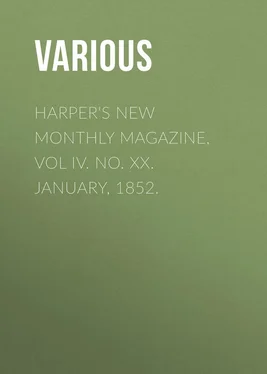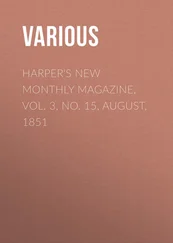Various - Harper's New Monthly Magazine, Vol IV. No. XX. January, 1852.
Здесь есть возможность читать онлайн «Various - Harper's New Monthly Magazine, Vol IV. No. XX. January, 1852.» — ознакомительный отрывок электронной книги совершенно бесплатно, а после прочтения отрывка купить полную версию. В некоторых случаях можно слушать аудио, скачать через торрент в формате fb2 и присутствует краткое содержание. Издательство: Иностранный паблик, Жанр: periodic, foreign_edu, на английском языке. Описание произведения, (предисловие) а так же отзывы посетителей доступны на портале библиотеки ЛибКат.
- Название:Harper's New Monthly Magazine, Vol IV. No. XX. January, 1852.
- Автор:
- Издательство:Иностранный паблик
- Жанр:
- Год:неизвестен
- ISBN:нет данных
- Рейтинг книги:3 / 5. Голосов: 1
-
Избранное:Добавить в избранное
- Отзывы:
-
Ваша оценка:
- 60
- 1
- 2
- 3
- 4
- 5
Harper's New Monthly Magazine, Vol IV. No. XX. January, 1852.: краткое содержание, описание и аннотация
Предлагаем к чтению аннотацию, описание, краткое содержание или предисловие (зависит от того, что написал сам автор книги «Harper's New Monthly Magazine, Vol IV. No. XX. January, 1852.»). Если вы не нашли необходимую информацию о книге — напишите в комментариях, мы постараемся отыскать её.
Harper's New Monthly Magazine, Vol IV. No. XX. January, 1852. — читать онлайн ознакомительный отрывок
Ниже представлен текст книги, разбитый по страницам. Система сохранения места последней прочитанной страницы, позволяет с удобством читать онлайн бесплатно книгу «Harper's New Monthly Magazine, Vol IV. No. XX. January, 1852.», без необходимости каждый раз заново искать на чём Вы остановились. Поставьте закладку, и сможете в любой момент перейти на страницу, на которой закончили чтение.
Интервал:
Закладка:
The other two boys were disposed to give up to Collins, unreasonable as he was. “Let us row,” said they, “what signifies it?” But Franklin, whose resentment was now aroused, opposed this, and persisted in refusing. Collins then declared that he would make him row or throw him overboard; and he came along, stepping on the thwarts, toward Franklin, as if to put his threat in execution. When he came near he struck at Franklin, but Franklin just at the instant thrust his head forward between Collins’s legs, and then rising suddenly with all his force he threw him over headlong into the water.
Franklin knew that Collins was a good swimmer, and so he felt no concern about his safety. He walked along to the stern of the boat, and asked Collins if he would promise to row if they would allow him to get on board again. Collins was very angry, and declared that he would not row. So the boys who had the oars pulled ahead a few strokes, to keep the boat out of Collins’s reach as he swam after her. This continued for some time – Collins swimming in the wake of the boat, and the boys pulling gently, so as just to keep the boat out of his reach – while Franklin himself stood in the stern, interrogating him from time to time, and vainly endeavoring to bring him to terms. At last finding him beginning to tire without showing any signs of yielding, for he was obstinate as well as unreasonable, the boys stopped and drew him on board, and then took him home dripping wet. Collins never forgave Franklin for this. A short time after this incident, however, he obtained some engagement to go to the West Indies, and he went away promising to send back money to Franklin, to pay him what he owed him, out of the very first that he should receive. He was never heard of afterward.
In the mean time Franklin returned to his work in Mr. Keimer’s office. He reported the result of his visit to Boston, to Sir William, the governor, informing him that his father was not willing to furnish the capital necessary for setting up a printing office. Sir William replied that it would make no difference; he would furnish the capital himself, he said; and he proposed that Franklin should go to England in the next vessel, and purchase the press and type. This Franklin agreed to do.
In the mean time, before the vessel sailed, Franklin had become very much attached to Miss Read. He felt, he says, a great respect and affection for her, and he succeeded, as he thought, in inspiring her with the same feelings toward him. It was not, however, considered prudent to think of marriage immediately, especially as Franklin was contemplating so long a voyage.
Besides the company of Miss Read there were several young men in Philadelphia whose society Franklin enjoyed very highly at this time. His most intimate friend was a certain James Ralph. Ralph was a boy of fine literary taste and great love of reading. He had an idea that he possessed poetic talent, and used often to write verses, and he maintained that though his verses might be in some respects faulty, they were no more so than those which other poets wrote when first beginning. He intended, he said, to make writing poetry the business of his life. Franklin did not approve of such a plan as this; still he enjoyed young Ralph’s company, and he was accustomed sometimes on holidays to take long rambles with him in the woods on the banks of the Schuylkill. Here the two boys would sit together under the trees, for hours, reading, and conversing about what they had read.
At length the time arrived for the sailing of the ship in which Franklin was to go to England. The governor was to have given him letters of introduction and of credit, and Franklin called for them from time to time, but they were not ready. Finally he was directed to go on board the vessel, and was told that the governor would send the letters there, and that he would find them among the other letters, and could take them out at his leisure. Franklin supposed that all was right, and accordingly after taking leave of Miss Read, to whom he was now formally engaged, and who wished him heartily a good voyage and a speedy return, he proceeded to Newcastle, where the ship was anchored, and went on board.
On the voyage Franklin met with a variety of incidents and adventures, which, however, can not be particularly described here. Among other things he made the acquaintance of a certain gentleman named Denham, a Friend , from Philadelphia, who afterward rendered him very essential service in London. He did not succeed in finding the governor’s letters immediately, as the captain told him, when he inquired for them, that the letters were all together in a bag, stowed away. He said, however, that he would bring out the bag when they entered the channel, and that Franklin would have ample time to look out the letters before they got up to London.
Accordingly when the vessel entered the channel the letters were all brought out, and Franklin looked them over. He did not find any that seemed very certainly intended for him, though there were several marked with his name, as if consigned to his care. He thought that these must be the governor’s letters, especially as one was addressed to a printer and another to a bookseller and stationer. He accordingly took them out, and on landing he proceeded to deliver them. He went first with the one which was addressed to the bookseller. The bookseller asked him who the letter was from. Franklin replied that it was from Sir William Keith. The bookseller replied that he did not know any such person, and on opening the letter and looking at the signature, he said angrily that it was from Riddlesden, “a man,” he added, “whom I have lately found to be a complete rascal, and I will have nothing to do with him or receive any letters from him.” So saying he thrust the letter back into Franklin’s hands.
Poor Franklin, mortified and confounded, went immediately to Mr. Denham to ask him what it would be best for him to do. Mr. Denham, when he had heard a statement of the case, said that in all probability no one of the letters which Franklin had taken was from the governor. Sir William, he added, was a very good-natured man, who wished to please every body, and was always ready to make magnificent offers and promises but not the slightest reliance could be placed upon any thing that he said.
So Franklin found himself alone and moneyless in London, and dependent wholly upon his own resources. He immediately began to seek employment in the printing offices. He succeeded in making an engagement with a Mr. Palmer, and he soon found a second-hand bookstore near the printing office, where he used to go to read and to borrow books – his love of reading continuing unchanged.
In a short time Franklin left Mr. Palmer’s and went to a larger printing office, one which was carried on by a printer named Watts. The place was near Lincoln’s Inn Fields, a well known part of London. Here he was associated with a large number of workmen, both compositors and pressmen. They were very much astonished at Franklin’s temperance principles, for he drank nothing but water, while they consumed immense quantities of strong beer. There was an ale-house near by, and a boy from it attended constantly at the printing office to supply the workmen with beer. These men had a considerable sum to pay every Saturday night out of their wages for the beer they had drank; and this kept them constantly poor. They maintained, however, that they needed the beer to give them strength to perform the heavy work required of them in the printing office. They drank strong beer, they said, in order that they might be strong to labor. Franklin’s companion at the press drank a pint before breakfast, a pint at breakfast, a pint between breakfast and dinner, a pint at dinner, a pint in the afternoon at six o’clock, and a pint when he had done his day’s work. Some others drank nearly as much.
Читать дальшеИнтервал:
Закладка:
Похожие книги на «Harper's New Monthly Magazine, Vol IV. No. XX. January, 1852.»
Представляем Вашему вниманию похожие книги на «Harper's New Monthly Magazine, Vol IV. No. XX. January, 1852.» списком для выбора. Мы отобрали схожую по названию и смыслу литературу в надежде предоставить читателям больше вариантов отыскать новые, интересные, ещё непрочитанные произведения.
Обсуждение, отзывы о книге «Harper's New Monthly Magazine, Vol IV. No. XX. January, 1852.» и просто собственные мнения читателей. Оставьте ваши комментарии, напишите, что Вы думаете о произведении, его смысле или главных героях. Укажите что конкретно понравилось, а что нет, и почему Вы так считаете.












